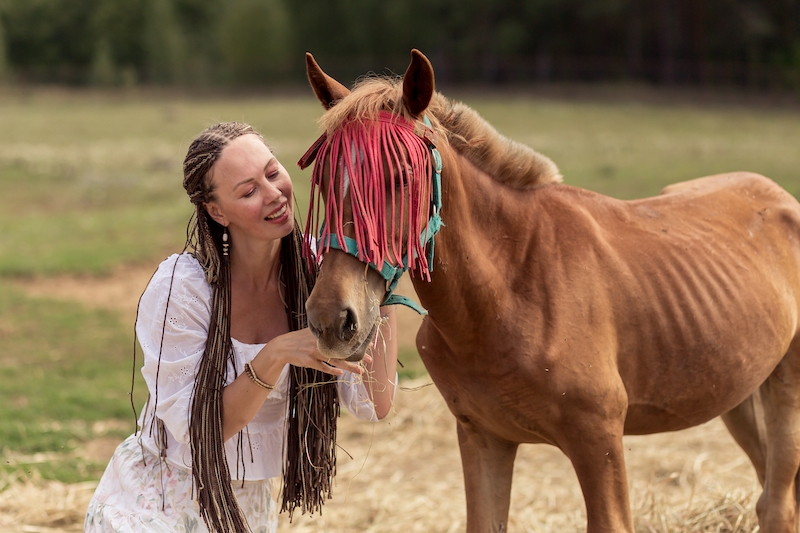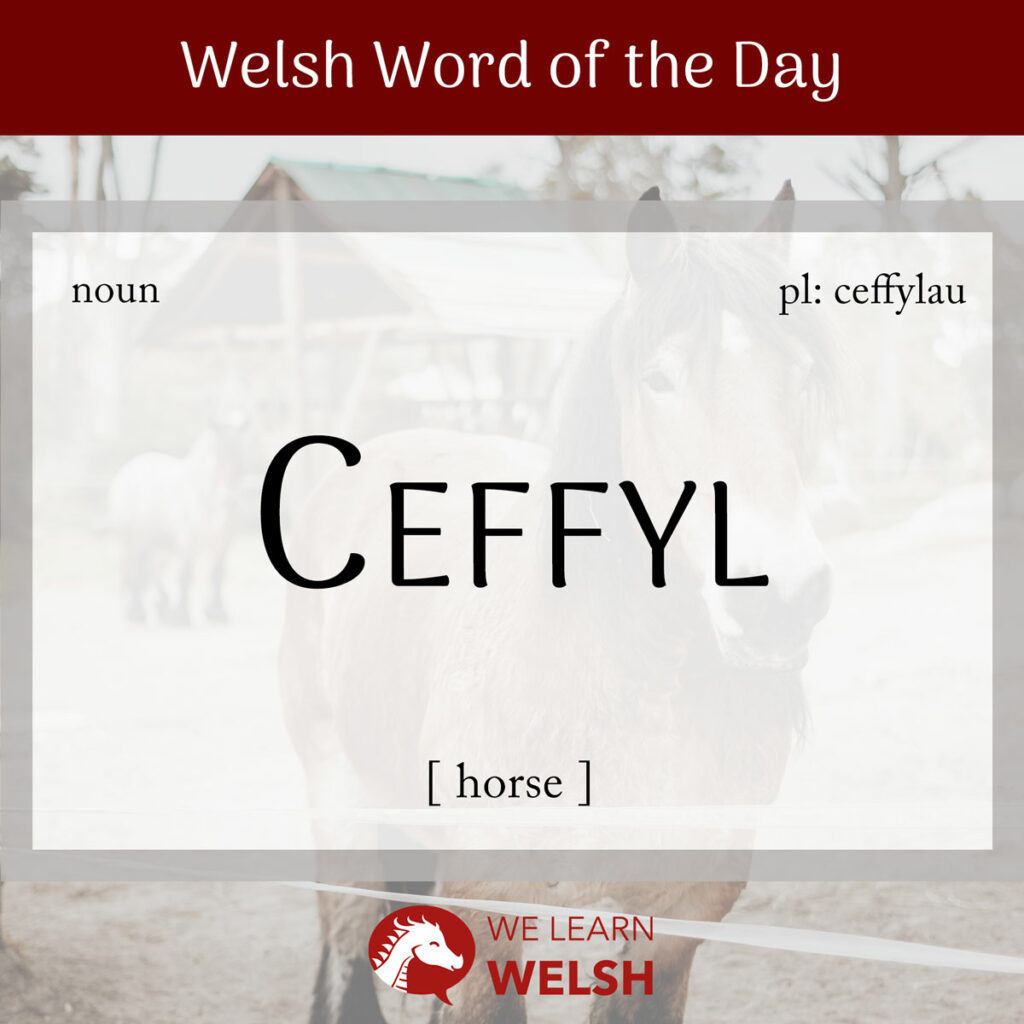Few animals have had such a great impact on British civilisation as the humble ceffyl (horse).
The domestication of horses began in Britain by the 25th century BC. Over the years, they have been used for warfare, agriculture and transportation. Today, horses are kept mostly for recreational purposes, but they remain a much-loved animal across the British Isles – and the world.
Since Wales is a particularly lovely place for marchogaeth (horse-riding), it’s no surprise that there are plenty of fun Welsh words and expressions related to ceffylau (horses).
ceffyl
horse
ceffylau
horses
You can tell that ceffyl comes from a proto-Brythonic root word, since our Breton cousins use the very similar kefel. It is probably related to the Latin caballus, which was used only for old or sick female ceffylau.
A rare synonym is cel, but it’s more common to hear this in stories and poems rather than in conversation.
As ceffyl is a masculine noun, there is a separate word for mare, which is caseg. These words follow the same pattern of mutations because they both start with the same letter. Here it is demonstrated with ceffyl:
Soft mutation
geffyl
Nasal mutation
ngheffyl
Aspirate mutation
cheffyl
A foal is almost always ebol – the variants swclyn and cyw ceffyl (horse’s chick) are much less common. A pony is merlyn if male and merlen if female, though some people may just say poni. Large ponies used for work are called cobiau, like English cobs.
A stallion in Welsh is usually called a march, a word which used to be, and is still occasionally, used to describe horses more generally. Note that many Welsh speakers use the word stalwyn or staliwn instead of march when talking about stallions.
Interestingly, a few other species get their names from the march:
- march môr = seahorse / sea snake
- march y dŵr = water spider, also called gafr y dŵr
- march asgellog = winged horse / Pegasus
- pedol y march = horseshoe vetch, a kind of flowering plant
- marchgranc = horseshoe crab
- afonfarch = an old-fashioned word for hipopotamws, hippo
Cadfarch is an old-fashioned word for a warhorse.
And as you may have noticed, marchogaeth derives from this word, too. But this isn’t the only word for horse-riding that you will hear used in Wales, with marchocáu and ffogieth being occasional alternatives. And the practice may often just be described as mynd ar gefn ceffyl (going on horseback).
To ride a horse as a verb is marchogi generally, although in some parts of the South you may hear brochgau or brychgau instead. (There’s also a really fun Southern expression brochgau bagalabowt, which means riding astride). The simple reidio comes up a lot in everyday speech.
I got to go reidio a couple of times as a kid when my sister requested it for her birthday, and I have to admit I was pretty terrible at it. I loved being around the gentle ceffylau, getting to stroke them and feed them afalau (apples) – but being on top of them was a bit terrifying.
So I never went any faster than cerdded (walking), but my sister did try out tuthio / trotian (trotting). Rhygyngu (cantering) or carlamu (galloping) would definitely have been too fast for either of us!
Mae’r ceffyl gwyn yn carlamu.
The white horse is galloping.
Ceffylau are a kind of carnolyn (ungulate), meaning they are large mamaliaid (mammals) with carnau (hooves). They’re also known for their beautiful myngau (manes). One thing I find whenever I meet a horse is that they’re always bigger than I expect!
Many species of these dof (tame) animals are actually native to the British Isles, including a couple of Welsh breeds, such as the cob Cymreig (Welsh cob) and merlyn bach y mynydd (Welsh mountain pony).
Because horses played such a prominent role in British society, it shouldn’t come as a surprise that many Welsh idioms contain either ceffyl or march.
Some of these are very similar to existing English idioms, probably because they’ve been translated more or less directly into Welsh. These include ar gefn ei ceffyl (on his horse, equivalent of on his high horse) or rhoi’r drol o flaen y ceffyl (to put the cart before the horse). Cyfrif dannedd ceffyl rhodd (counting a gift horse’s teeth) and has the same meaning as looking a gift horse in the mouth.
Others are more unique, such as trin ceffyl pobl eraill (dealing with other people’s horses), which means to gossip, or ar gefn ei geffyl cwta (on the back of his short horse), which means to have a temper. One inspirational example is ceffyl da yw ewyllys, meaning the will is a good horse. It’s a bit like where there’s a will there’s a way, reminding us that our own willpower is our best attribute.
Paid â thrin ceffyl pobl eraill, y cleciwr!
Stop going on about other people’s business, you gossip!
You may have heard of the mysterious Scottish beast the kelpie, a horse-shaped demon that is said to live in lochs and can shapeshift into a human. In fact, the Welsh have a similar folk tale, that of the ceffyl dŵr (water horse).
This sinister bwgan (bogy-monster) lives in rivers and waterfalls, particularly in mountainous areas, and will approach tired travelers offering them the chance to ride home on its back. However, the unwitting victim would then be dragged to their death.
Some stories describe ways of capturing the ceffyl dŵr and putting it to work, but invariably it escapes and gets the better of its captor.
There are more pleasant tales – in South Wales, the ceffyl dŵr might be represented as a less dangerous beast, and in some stories could even genuinely offer help to travellers. And there was a general folk belief that clergymen were immune from the curse of the ceffyl dŵr and could use this spirit to safely ride to their destination.
Mae rhai ceffylau yn rhuslyd iawn.
Some horses are very skittish.
Here’s some more geirfa geffylaidd (equine vocabulary) for the horse lovers among you:
- pedol = horseshoe
- pynfarch = packhorse
- cyfrwy = saddle
- ffrwyn = bridle
- botasau marchog = riding boots
- delltio = to whip (a horse)
- cre o geffylau = a group of horses
- gwŷr meirch / marchoglu = cavalry
- ceffyl ras = racehorse
- gweryru = to neigh or whinny
Though I must say that as someone who doesn’t know the first thing about horses, there’s probably a lot of important geirfa that I wouldn’t be able to tell you in any language – so do let us know if we’ve missed any words!


